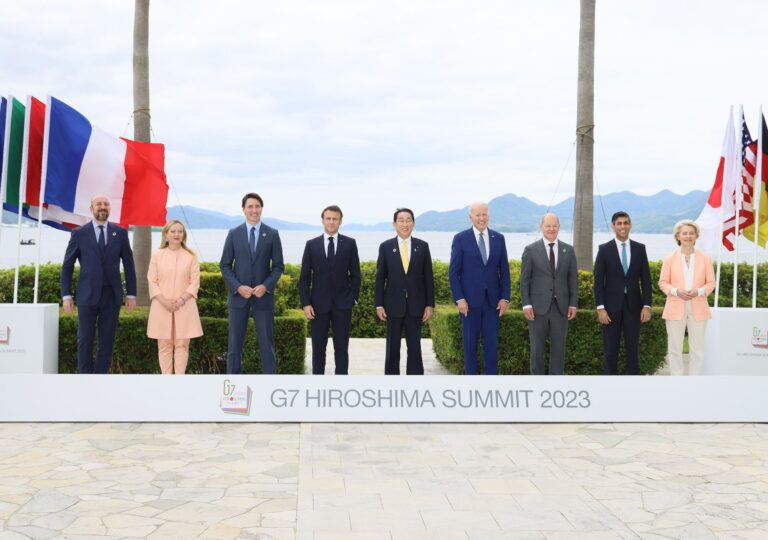The G7, an informal bloc of industrialized democracies comprising the United States, Canada, France, Germany, Italy, Japan, and the United Kingdom, convenes annually to address various global concerns, including economic governance, security, and energy.
While proponents highlight the forum’s conducive environment for collective decision-making, critics emphasize its occasional lack of follow-through and exclusion of significant emerging powers.
The G7’s composition has evolved, with Russia’s membership suspended since 2014 due to its annexation of Crimea.
Table of Contents
Why was the G7 formed, and how does it work?
The G7 was formed in 1975 by the United States, France, Italy, Japan, the UK, and West Germany to address pressing economic concerns.
Initially known as the Group of Six, it aimed to provide a platform for non-communist powers to tackle issues such as inflation and recession triggered by the OPEC oil embargo. The inclusion of Canada and the European Union (EU) entry as a “nonenumerated” member in 1981 further broadened its scope.
The G7 comprises wealthy democracies with no formal criteria for membership. The G7 member states (excluding the EU) account for approximately 44 percent of the global economy’s nominal GDP. Unlike formal institutions like the United Nations or NATO, the G7 operates without a charter or secretariat.
The presidency rotates annually among member states, with the incumbent president responsible for setting the agenda and logistical arrangements for the summit. Before the gathering of national leaders, ministers, and envoys, known as sherpas, engage in meetings to develop policy initiatives. Occasionally, nonmember countries are invited to participate in G7 meetings, enhancing inclusivity and dialogue.
G7, what happened with Russia
Russia formally joined the G7 in 1998, expanding the group to the G8. The decision to include Russia aimed to provide the country with international prestige and encourage closer alignment with Western values.
However, Russia’s actions under President Vladimir Putin, including the annexation of Crimea in 2014 and support for Syria’s Bashar al-Assad, strained its relationship with the G7.
As a result, Russia was indefinitely suspended from the group. Tensions further escalated with Russia’s interference in elections and its intervention in Ukraine, leading to increased economic sanctions imposed by the United States and the European Union.
In response to Russia’s full-scale invasion of Ukraine in 2022, the G7 implemented unprecedented sanctions, including phasing out Russian oil and gas imports and imposing restrictions on Russian banks. The G7 members have also pledged significant financial aid to Ukraine and provided military support.
What other challenges the G7 group faces
The G7 has faced several significant challenges in recent years. During American President Donald Trump’s tenure, his divergent views on trade, climate, and Russia strained unity within the group. Trump’s refusal to commit to the Paris Agreement on climate and his contentious relationships with other G7 leaders created concerns about transatlantic relations and the group’s cohesion.
Additionally, the rise of China as a global power has posed challenges. The group has condemned China’s human rights abuses and alleged unfair trading practices. However, divisions within the G7 on responding to China, particularly regarding economic ties, have complicated efforts to address these issues effectively.
Furthermore, the COVID-19 pandemic has added additional obstacles. The pandemic led to a global economic contraction, requiring massive stimulus measures from governments. However, as countries recover, they face high inflation and food insecurity levels.
The nuclear threats from Russia and North Korea have also renewed concerns about nuclear weapons, while the rapid advancement of artificial intelligence has raised fears of an increased risk of nuclear conflict.
Addressing these complex challenges requires the Summit to navigate geopolitical tensions, find common ground on trade and climate policies, and effectively develop strategies to counter China’s influence.
Are there alternatives to the G7?
While the G7 has faced challenges to its relevance and effectiveness, there are alternatives and proposals for new multilateral arrangements. The Group of Twenty (G20) has emerged as a prominent forum, surpassing the G7 regarding power and influence.
The G20 includes major emerging powers like Brazil, China, India, and South Africa, which are absent from the Summit. With its broader representation, the G20 represents a larger global GDP and population share. However, achieving consensus within the G20 has become increasingly difficult in recent years, as divisions on trade and other issues have emerged among member states.
There are also calls for new multilateral arrangements beyond the G7 and G20. One proposal is the expansion of the G7 to include countries like Australia, India, and South Korea, forming a “D10” group of democracies.
Another suggestion is establishing a new concert of powers involving the United States, China, the EU, India, Japan, and Russia. This proposed system would focus on practical cooperation and have permanent representatives supported by a secretariat, providing a more continuous and structured approach than the periodic summits of the G7 and G20.
Such alternative arrangements aim to address the limitations of existing forums and foster meaningful collaboration among key global powers.
Read also: G7 in Hiroshima, the topics on the agenda: alignment on sanctions to Moscow and relations with China












